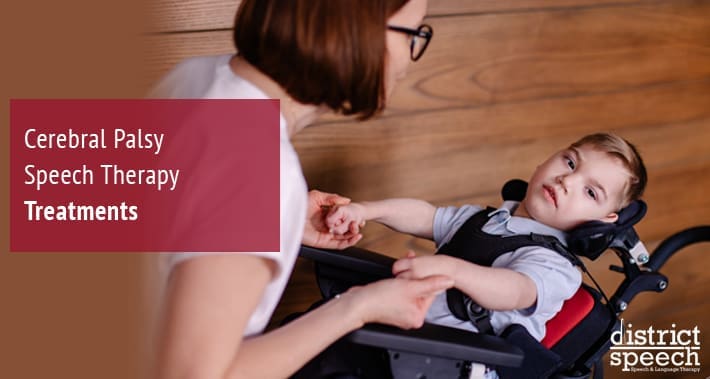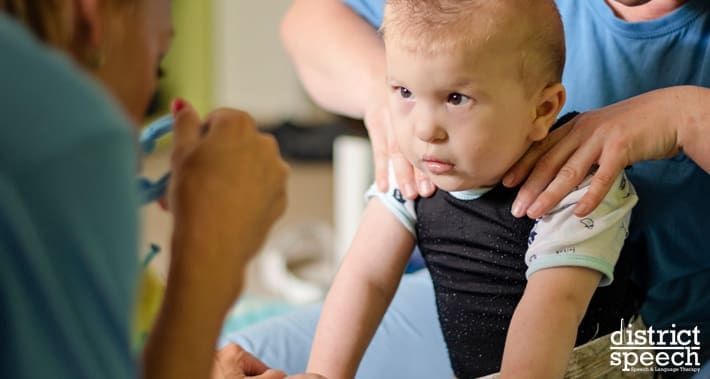
Has your child been diagnosed with cerebral palsy?
If so, you likely have a team of different healthcare providers working to make sure your child gets the best start to life.
One of those ought to be a pediatric speech therapist.
This is because children with cerebral palsy often have trouble moving the muscles in their face, throat, neck, and head.
Subsequently, more than half of children living with cerebral palsy experience troubles with their speaking, chewing, and swallowing skills.
Fortunately, we can help.
At District Speech, our licensed speech pathologists can help your child overcome their obstacles to communication.
Speech therapy services can provide a multitude of benefits for children living with cerebral palsy.
Let’s take a closer look.
What Is Cerebral Palsy?
Cerebral palsy gets its name from two Latin words: “cerebral”, meaning brain, and “palsy”, meaning body weakness or paralysis.
Therefore, cerebral palsy is a group of disorders affecting the brain and resulting in impaired muscle movement and coordination.
Children living with cerebral palsy may also have trouble with their hearing, vision, and other senses.
Cerebral palsy is the most common cause of motor disabilities in childhood, affecting around 4 out of every thousand kids.
Types Of Cerebral Palsy
Cerebral palsy typically emerges as one of four subtypes.
However, many children with cerebral palsy will present with mixed types.
Spasticity, the most common type, affects approximately 80% of children with cerebral palsy.
Spastic cerebral palsy typically causes muscle stiffness and exaggerated reflexes, which makes walking difficulty.
Ataxia, the least common type of cerebral palsy, causes involuntary muscle movements that appear disorganized or clumsy.
Children with ataxic cerebral palsy may struggle with balance, coordination, walking, and fine motor skills.
Similarly, dyskinesia causes difficulties controlling body movements.
Children living with dyskinetic cerebral palsy often have unusual, uncontrollable movements in the arms, legs, and hands, face, and tongue.
Dyskinetic cerebral palsy often causes difficulties with sitting, walking, swallowing, and talking.
RELATED: Pediatric Speech Therapy For Feeding And Swallowing Disorders
RELATED: What Is Pediatric Dysphagia
The last type of cerebral palsy, hypotonia, results in weakened and overly relaxed muscles.
The result is limbs that move very easily and appear floppy or rag doll like.
Children living with hypotonic cerebral palsy have little control over their heads and subsequently may experience breathing difficulties.
As they develop, children living with hypotonic cerebral palsy often experience trouble sitting up, difficulty speaking, poor reflexes, and walking abnormalities.
Cerebral Palsy Symptoms
The types and severity of cerebral palsy symptoms will differ from person to person.
For example, some children with cerebral palsy have trouble walking and sitting whereas others have trouble grasping objects.
Additionally, the symptoms of cerebral palsy can improve or worsen as motor skills develop.
Common symptoms of cerebral palsy include:
- Developmental delays
- Difficulty walking
- Difficulty speaking
- Excessively floppy or stiff muscle tone
- Excessive drooling and trouble swallowing
- Favoring one side of the body
- Neurological issues, such as seizures, intellectual disabilities, and blindness
What Causes Cerebral Palsy?
In most cases, the exact cause of cerebral palsy has yet to be discovered.
The majority of children living with cerebral palsy were born with the disorder, however; they may not show symptoms until months later.
This type of cerebral palsy is referred to as congenital cerebral palsy.
In other cases, cerebral palsy emerges as a result of atypical brain development in utero or a brain injury attained during birth or within the first few years of life.
RELATED: How Can A Speech Therapist Help You Recover From Traumatic Brain Injury?
Cerebral palsy that develops after birth is referred to as acquired cerebral palsy.
Other causes of cerebral palsy may include:
- Bleeding in the brain (intracranial hemorrhage)
- Brain infections, such as encephalitis or meningitis
- Infections acquired in the womb, such as rubella and herpes simplex
- Lack of oxygen to the brain during birth (asphyxia neonatorum)
- Gene mutations resulting in atypical brain development
- Severe jaundice during infancy
Additionally, potential risk factors for cerebral palsy may include:
- Premature birth
- Low birth weight
- Low Apgar score, which is used to determine the physical health of newborns
- Breech births
- Rh incompatibility, which occurs when a pregnant parent’s blood type is incompatible with their baby’s blood type
- Exposure to toxic substances during pregnancy, such as recreational drugs or certain medications
- Being a twin or triplet

How Can A Speech Therapist For Cerebral Palsy Help?
If your child has cerebral palsy, a speech therapist can help.
The main goals of speech therapy for cerebral palsy include:
- Improvement of speech and communication through strengthen of muscles associated with speech
- Improvement of oral motor skills
- Increasing your child’s understanding of speech and language
Your child’s speech therapist can also help them with eating, chewing, and swallowing difficulties.
The exact methods used during speech therapy for cerebral palsy will depend on the specific cause of your child’s cerebral palsy as well as their specific strengths and limitations.
For example, children with spastic cerebral palsy often require assistance improving the speed and precision of their oral movements.
Speech therapy for cerebral palsy can also help with:
- Articulation
- Pronunciation
- Fluency
- Sound and word formation
- Listening
- Pitch
- Intonation
- Building their vocabulary
- Speech volume
- Word comprehension
- Word object association
- Breath support and control
- Chewing
- Swallowing
- Speech muscle coordination and strength
Speech therapy for cerebral palsy will provide your child with a variety of benefits, including:
- Increased problem solving capabilities
- Increased independence
- Improved literacy
- Improved socialization
- Improved self esteem
- Improved swallowing function and safety
RELATED: Speech Therapy For Learning And Reading Impairments
Early intervention speech therapy has been shown to be more effective in treating cerebral palsy vs waiting until your child is older, so it’s a good idea to book an appointment as soon as possible.
Book Your Appointment With District Speech Today
Does your child have cerebral palsy?
Or, having read the symptoms, do you suspect your infant may have it?
If so, our Washington DC speech therapists can help them get the strongest start.
Book your appointment with District Speech today.
1300 I St NW, Suite 400 E,
Washington, DC 20005
- https://g.page/districtspeech
District Speech and Language Therapy specializes in speech therapy, physical therapy, and occupational therapy solutions, for both children and adults, in the Washington D.C and the Arlington Virginia areas.